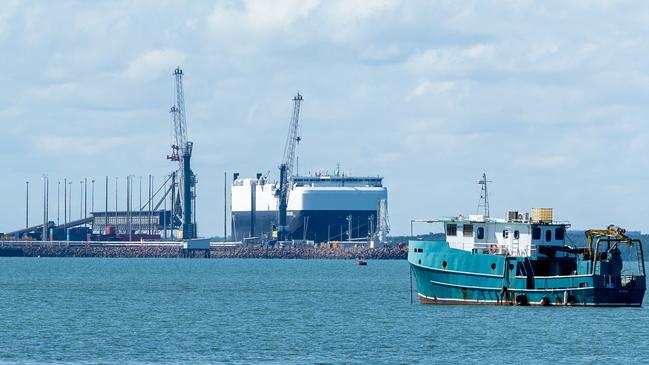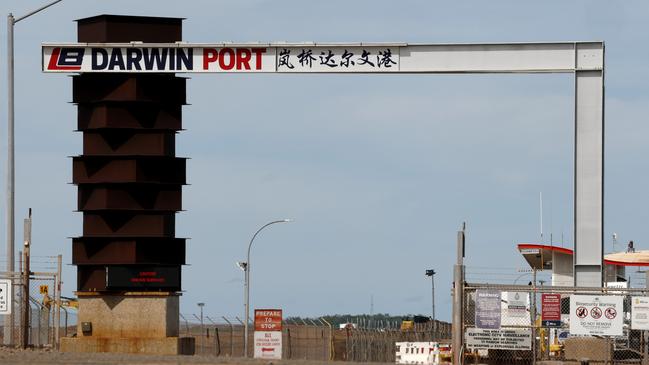
Anthony Albanese has a golden opportunity to quickly liberate the Port of Darwin from its 99-year lease to Chinese company Landbridge. This would deliver on his impromptu election pledge, made on April 4 to ABC evening radio in Darwin, that “we want it (the port) to be in Australian hands”.
Albanese said it was a mistake when “Darwin was flogged off to a Chinese buyer”. His government had been looking for potential buyers “informally”, but “if it reaches a point where the commonwealth needs to directly intervene, then we’d be prepared to do that”.
We know there is one firm seriously interested in taking over the lease. The Australian reported on Tuesday that New York-based Cerberus Capital Management is interested.
Cerberus is clearly trying to build a position in northern Australian infrastructure. In November last year the company announced it was partnering with a West Australian company, Crestlink, to build a supply and support base on Cockatoo Island. This is a $US300m ($463m) project to build a deepwater port and airfield.
Cockatoo Island is off the coast of WA near the town of Derby. Cerberus claims the base “will enhance security operations for the Australian Defence Force, Australian Border Force and emergency response services, given its strategic air and maritime position in the Buccaneer Archipelago”.
The Albanese government should be rejoicing if Cerberus is interested in taking over the port.
Have no doubt that the most promising development option for the port will come through expanded Australian Defence Force and US military use.
The most immediate need for expanded port access will be for the Australian Army. The government is close to announcing a design for eight Landing Craft Heavy vessels. These ships will displace 3900 tonnes, about the size of an Anzac frigate.
If you believe Labor’s press release from November last year, the LCHs will start to be built in Henderson, WA, in 2026. The press release doesn’t tell you that the first two ships will be home-ported in Darwin, near 1st Brigade, whose equipment the ships will carry.
Defence has no funding to build new port infrastructure for the LCHs. The tiny patrol boat base is not designed for such ships, so the Port of Darwin is the only alternative.
The other role the Port of Darwin should be gearing to play is to support an expanded US Marine Corps, Army and Air Force presence in the top end. The US military presence has been growing in the north for some time. It will continue to grow as the US looks to disperse its military forces in the Indo-Pacific.
I have no doubt that my old department, Defence, is still sufficiently shell-shocked from the Port of Darwin lease experience in 2015 to believe it would be fine to make the Chinese-leased port the hub of its emerging amphibious capability.
Fortunately, neither side of Australian politics believes the pathetic excuses Defence and the wider public service used to justify the port being leased to Landbridge.

I wouldn’t be surprised if Landbridge would see losing the lease as a blessing. The parent company in China is in financial trouble. China’s Security Regulatory Commission has fined Landbridge for failing to produce annual reports. Landbridge’s owner, Ye Cheng, has had to provide personal guarantees to the company’s creditors.
Landbridge in China has amassed substantial debts, most particularly for buying and modernising a major port in Panama. This happened shortly after the Port of Darwin lease arrangement as the company sought to link itself to Xi Jinping’s now failing Belt and Road project.
Landbridge in Darwin has never delivered on promises to develop a big resort hotel near the port or to build lateral industries that would export through the port. In 2023-24, Landbridge reported a $34m net loss in port operations. This reflects a “financial strategy” to repay the Chinese parent company for the lease’s original costs.
What keeps Landbridge stuck in place is a Chinese Communist Party determination not to be seen taking a backward step on the Belt and Road project. This explains why China’s ambassador in Canberra intervened on Monday to claim: “It is ethically questionable to lease the port when it was unprofitable and then seek to reclaim it once it becomes profitable.” No one in Australia should pause to take lessons on ethics from Beijing’s ambassador. The truth is, the only value the Port of Darwin lease offers China today is that it prevents the more important and more immediate Australian and allies’ military use of the facility.
Darwin can become a strong part of a regional deterrence strategy focused on dampening Chinese military adventurism. That’s another strong alliance proposition Albanese can take to Donald Trump for that eagerly awaited Oval Office meeting.
Peter Jennings is a director of Strategic Analysis Australia



